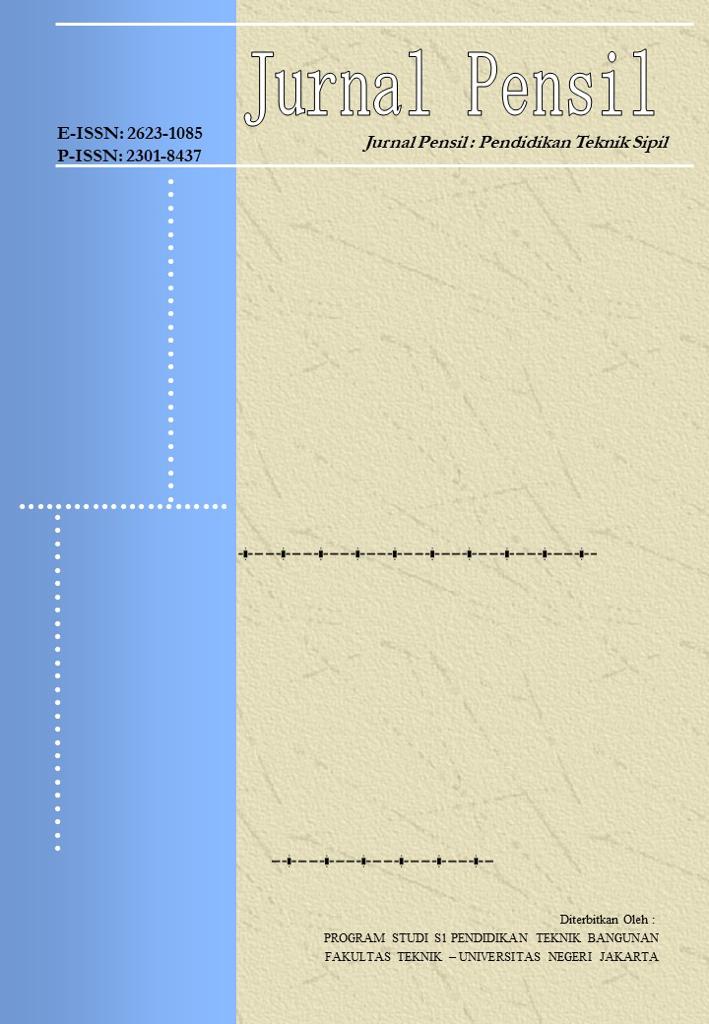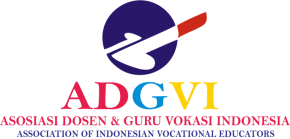A IMPROVING VOCATIONAL STUDENT COMPETENCIES THROUGH INDUSTRIAL CLASS-BASED EXPERIANTIAL LEARNING
Abstract
This research aims to evaluate the implementation of industrial class-based experiential learning in Vocational High Schools (SMK) and its impact on increasing student competency, which is considered crucial in facing the challenges of industrial development in Indonesia. This learning approach is expected to provide an authentic and relevant learning experience to the needs of the world of work, proven to increase students' motivation, learning outcomes and practical skills in various subjects through a literature review. However, the high unemployment rate of vocational school graduates and the lack of connection between the school curriculum and industrial demands show the urgency of developing learning models that better integrate education with industrial needs. The Systematic Literature Review (SLR) method was used to analyze ten related previous studies, showing that the experiential learning model had a positive impact on learning motivation and learning outcomes of vocational school students. However, research highlights the limitations of implementing industry-based experiential learning for it requires collaboration between schools, government and industry. Involving industry in the learning process is expected to provide students with direct experience, increasing their readiness to enter the world of work. This research contributes to detailing the benefits of industrial class-based experiential learning in vocational schools and highlights the need for increased implementation of this model. The findings of this research are the basis for further research and efforts to develop vocational education in Indonesia.
References
Adnyana, KS, Widiastuti, NPK, & Suastra, IW (2022). Development of a New Paradigm Curriculum by Strengthening Critical Thinking in Elementary School Students in Higher Classes. Journal of Basic Education Flobamorata, 3(2), 14–23.https://doi.org/10.51494/jpdf.v3i2.681
Adrian, QJ, Putri, NU, Jayadi, A., Sembiring, JP, Sudana, IW, Darmawan, OA, ... & Ardiantoro, NF (2022). Introduction to the Canva Application for Students of SMKN 1 Tanjung Sari, South Lampung. Journal of Social Sciences and Technology for Community Service (JSSTCS), 3(2), 187-191. https://doi.org/10.33365/jsstcs.v3i2.2020
Achsani, H., Kustono, D., & Suhartadi, S. (2020b). Industrial Class Model in the Mitsubishi School Program at Vocational High Schools. Journal of Education: Theory, Research and Development, 5(8), 1078.https://doi.org/10.17977/jptpp.v5i8.13878
Anggraeni, W., Susano, A., & Suyahya, I. (2021). Systematic Literature Review (SLR) as an alternative research during the Covid-19 pandemic. KANGMAS (Scientific Work on Community Service), 137-141. https://doi.org/10.37010/kangmas.v2i2.313.
Arianto, A., Iriani, T., & Arthur, R. (2019). The Relationship between Instructional Communication and Learning Outcomes in Land Surveying at SMK Negeri 1 Jakarta. Pencil Journal: Civil Engineering Education, 8(1), 31-39.https://doi.org/10.21009/jpensil.v8i1.8481
Asyari, L., Nuriyanti, R., Gunawan, D., & Adiredja, RK The Influence of Experiential Learning Model on Primary School Student's Creative Thinking Skills. In Social, Humanities, and Educational Studies (SHES): Conference Series (Vol. 4, No. 1, pp. 70-76). https://doi.org/10.20961/shes.v4i1.48568
Astuti, ANF, & Sudana, IM (2023). Exploring Industrial Management Class at the Vocational High School in Indonesia. Journal of Educational and Social Research, 13(3), 181-190. https://doi.org/10.36941/jesr-2023-0068
Bradberry, L. A., & De Maio, J. (2019). Learning by doing: The long-term impact of experiential learning programs on student success. Journal of Political Science Education, 15(1), 94-111. https://doi.org/10.1080/15512169.2018.1485571
Castillo, R.M., Olorga, PDA, Lagran, MFN, & Carpio, A.J.H. (2023). The pyramid of experiential learning international relations through NationStates game. International Journal of Mobile Learning and Organization, 17(1-2), 58-75. https://www.inderscienceonline.com/doi/pdf/10.1504/IJMLO.2023.128349
Darmayoga, IW (2023). Application of Experiential Learning Learning Methods Assisted by Audiovisual Media to Improve Student Learning Outcomes. Education: Journal of Basic Education, 4(1), 1-10. https://jurnal.stahnmpukuturan.ac.id/index.php/edukasi
Devira, R. (2020). Improving Short Story Writing Skills Based on the Experience of SMP Negeri 2 Bukittinggi Students. 2135, 60–68. https://doi.org/10.47269/gb.v6i1.106
Fadieny, N., & Fauzi, A. (2021). Usefulness of e-module based on experiential learning in physics learning. International Journal of Progressive Sciences and Technologies, 25(1), 410-414.
http://ijpsat.ijsht-journals.org/
Fajri Masse, D., Sumual, HM, Eng, M., & Mapaliaey, DO (2021). The Influence of the Experiential Learning Model on Basic Automotive Technology Learning Outcomes. Gearbox Journal of Mechanical Engineering Education, 2(2), 39–45. http://ejurnal-mapalus-unima.ac.id/index.php/gearbox
Fatimah, F., Windyariani, S., & Setiono, S. (2024). Students' metacognitive skills using the experiential learning model on the human respiratory system material. Eduproxima (scientific journal of science education), 6(1), 348-357. https://doi.org/10.29100/.v6i1.4382
Fithriyah, K., Arif, M., & Ningsih, PR (2019). The Influence of the Experiential Learning Model on Student Motivation and Learning Outcomes in Digital Simulation Subjects at SMK Negeri 2 Bangkalan. Edutic Scientific Journal, 6(1), 39–45. https://journal.trunojoyo.ac.id/edutic/article/view/6389
Firdaus, F. (2018). Benefits of Guest Teachers for Improving Cognitive, Affective and Psychomotor Abilities for Class XI Motorcycle Engineering at SMK YPTN Bangkinang City. Tambusai Education Journal, 2(2), 205. https://doi.org/10.31004/jpt.v2i2.668
Garnadi, A., Helmawati, H., & Yoseptry, R. (2022). Industrial and Industrial Class Management in the World of Work (IDUKA) in Improving Student Competence (Case Study at Entrepreneurship Vocational School and PGRI 3 Vocational School, Cimahi City). JIIP - Scientific Journal of Educational Sciences, 5(4), 1047–1058. https://doi.org/10.54371/jiip.v4i5.496
Hajjah, M., Munawaroh, F., Wulandari, AYR, & Hidayati, Y. (2022). Implementation of an experiential learning model to improve students' critical thinking skills. Natural Science Education Research, 5(1), 79-88. https://journal.trunojoyo.ac.id/nser/article/view/4371/6951
Hakima, A. curriculum(2020). The Role of the Experiential Learning Model in Fashion Skills-Based Education. Online Journal of Fashion Design, 9(03), 51-59. https://doi.org/10.26740/jotb.v9n03.p51-59
Ismaya, B., Perdana, I., Arifin, A., Fadjarajani, S., Anantadjaya, SP, & Muhammadiah, M. (2021). Merdeka Belajar in the Point of View of Learning Technology in the Era of 4.0 and Society 5.0. AL-ISHLAH: Journal of Education, 13(3), 1777–1785. https://doi.org/10.35445/alishlah.v13i3.556
Kurniawati, L., Kadir, K., & Octafiani, N. (2020). Improving Students' Creative Mathematical Thinking Abilities Through Experiential Learning Models. https://doi.org/10.15408/ajme.v1i2.14071
Kuper, H. (2020). Industry 4.0: changes in work organization and qualification requirements—challenges for academic and vocational education. Entrepreneurship Education, 3(2), 119–131. https://doi.org/10.1007/s41959-020-00029-1
Morris, T. H. (2020). Experiential learning–a systematic review and revision of Kolb's model. Interactive Learning Environments, 28(8), 1064-1077. https://doi.org/10.1080/10494820.2019.1570279
Muhammad, H., Murtinugraha, RE, & Musalamah, S. (2020). Development of Moodle-based e-learning media in research methodology courses. Pencil Journal: Civil Engineering Education, 9(1), 54-60.
NajahNihayah, AZ, Musolichah, T., & Rifqi, LH (2022). E-commerce and social commerce training to improve technopreneurship competencies in vocational students. GERVASI: Journal of Community Service, 6(3), 647-663.
Nugraha, J. (2022). Application of the Experiential learning Model to Improve Students' Ensemble Music Playing Skills in Arts and Culture Subjects. Science and Education Journal (SICEDU). https://sicedu.org/index.php/sicedu/article/view/19
Nurliani, N., Rosada, I., & Amri, AA (2022). Potential Start-Ups Through Experiential Learning. Ecosystem Scientific Journal. https://journal.unibos.ac.id/eco/article/view/1387 The Influence of the Experiential Learning Model on Elementary School Students' Narrative Writing Skills
Priambudi, P., Mahmudah, FN, & Susatya, E. (2020). Management of industrial classes in vocational high schools. Journal of Vocational Technology Education, 3(2), 87–97.
Private, USA (2023). Revitalization of Vocational Education in the Context of Creating a Conducive Investment Climate as a Form of Support for Article 10 of the Investment Law. Madani: Multidisciplinary Scientific Journal, 1(4).
Ramadhan, R., & Aulia, F. (2024). The Relationship between Self-Efficacy and Work Readiness in Vocational School Students. ARZUSIN, 4(1), 161-171.
Ridho, AMY (2021). Outdoor Education Model Based on Experiential Learning in Character Education for Junior High Schools (Doctoral dissertation, Jakarta State University). http://repository.unj.ac.id/id/eprint/31518
Rifa'i, H., Ryan Hamonangan, Dian Ade Kurnia, Kaslani, & Mulyawan. (2022). Implementation of the Decision Tree Algorithm in Classifying Student Competencies. COPERTYPE: Scientific Journal of Information and Computer Management, 6(1), 15–20. https://doi.org/10.32485/kopertip.v6i1.131
Riswati, Y., Indriayu, M., & Totalia, SA The Influence of Industrial Classes and Internal Locus of Control on the Work Readiness of Online Business and Marketing Vocational School Students in Surakarta. BISE: Journal of Business and Economic Education, 7(1), 83-93. https://doi.org/10.20961/bise.v7i1.72990
Rohman, AA, Suryawan, AI, & Priyanto, IJ (2019). Application of the Experiential Learning Model Assisted by Image Media to Increase Students' Handicraft Creativity. Educare: Journal of Education and Learning, 17(2), 119–126. Retrieved from http://jurnal.fkip.unla.ac.id/index.php/educare/ article/view/251
Saud, S., & Asnur, M.N.A. (2018). The impact of experiential learning in learning German speaking skills for students in higher education. http://eprints.unm.ac.id/14727/
Sulistyanto, S., Mutohhari, F., Kurniawan, A., & Ratnawati, D. (2021a). Competency needs in the era of industrial revolution 4.0: a review of vocational education perspectives. Journal of Vocational Gardening, 9(1), 25–35. https://doi.org/10.30738/jtv.v9i1.7742
Sunawardhani, N., & Casmudi, C. (2022). Implementation of the Center of Excellence Vocational School Program Based on Poultry Agribusiness Skills Competency at SMK Negeri 3 Penajam Paser Utara. Educative: Journal of Educational Sciences, 4(3), 4968–4981.https://doi.org/10.31004/edukatif.v4i3.2932
Susanti, T., Murniasari, F., & Oryza, D. (2023). Experiential Learning Model of Students' "Critical Thinking Ability": (Experiential Learning Model of Students' "Critical Thinking Ability"). BIODICS, 9(1), 157-166. https://doi.org/10.22437/bio.v9i1.21434
Ulfa, S.N.H. (2023). The Influence of Emotional Intelligence and Interest in Reading on Learning Achievement in Islamic Religious Education Subjects for Class XII Students at SMK Negeri 1 Ngasem Kediri (Doctoral dissertation, IAIN Kediri). https://etheses.iainkediri.ac.id:80/id/eprint/8929
Wahab, A., & Sudirman, S. (2023). Urban Poverty Problems. Kaganga: Journal of History Education and Social Humanities Research, 6(1), 230-238. https://doi.org/10.31539/kaganga.v6i1.5214
Walsiyam. (2022). Industrial Class Learning Management in Refrigeration and Air Conditioning Engineering Skills Competencies in Vocational Schools. Journal of Educational Management Media, 5(1), 125–136. https://doi.org/10.30738/mmp.v5i1.11531
Wahyuningsih, D., Indrawati, I., & Wahyuni, S. (2021). Learning motivation and understanding of physics concepts for vocational school students in learning using the experiential learning model. Journal of Physics Learning, 3(1), 70-76. https://doi.org/10.19184/jpf.v3i1.23241
Winandari, A., Sutimin, L.A., & Rejekiningsih, T. (2022). Benefits of Using Experiential Learning Based Electronic Modules to Facilitate Students Concierge Learning in Vocational High Schools. Journal of Educational Technology, 6(4). https://doi.org/10.23887/jet.v6i4.48064
Yusri, M. (2022). Best Practice for Increasing Achievement in Arts and Culture Learning through Experiential Learning Class
Copyright (c) 2024 Marini Fania, Tuti Iriani, Riyan Arthur

This work is licensed under a Creative Commons Attribution-ShareAlike 4.0 International License.



.jpg)








.png)
.png)
1.png)

